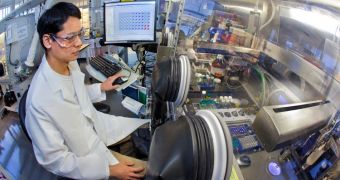Traditional techniques of producing nanocrystals are very labor-intensive and difficult to replicate exactly from one laboratory to the next. In order to streamline this process, researchers at the US Department of Energy's (DOE) Lawrence Berkeley National Laboratory (Berkeley Lab) have developed a new, one-of-a-kind robot that can synthesize colloidal nanocrystals automatically. The innovative instrument has been developed in cooperation with Symyx Technologies.
The machine, called Workstation for Automated Nanomaterial Discovery and Analysis, or WANDA for short, can produce the nanostructures with outstanding precision, eliminating human errors from the production process. An additional feature is that it can create the crystals based on custom specifications, which means it can create perfectly-suitable products for a host of applications in biologic labeling, the luminescent industry, or for advanced electronics devices.
“WANDA makes nanocrystals of exceptional quality – every time – optimized for different applications. We’re providing these to users and now just starting to use WANDA to discover new nanocrystal compositions with advantageous properties,” explains the director of the Inorganic Nanostructures Facility, at the Berkeley Lab Molecular Foundry, Delia Milliron. The same technique that WANDA uses to sift through a large, diverse pool of materials for specific applications has been in use in the pharmaceutical industry for many years, and this is the first time it is translated to nanotechnology.
“This technology will change the way nanoscience research is performed. Not only does WANDA enable the optimization and mass production of nanoparticles our users need, but this robot also facilitates experiments that give us a deeper understanding into the chemistry and physics of nanoscale materials,” adds Molecular Foundry senior scientific engineering associate, Emory Chan. Details of how the revolutionary robot operates can be found in the latest issue of the esteemed scientific journal Nano Letters. Funding for the work came from the DOE Office of Science.

 14 DAY TRIAL //
14 DAY TRIAL //